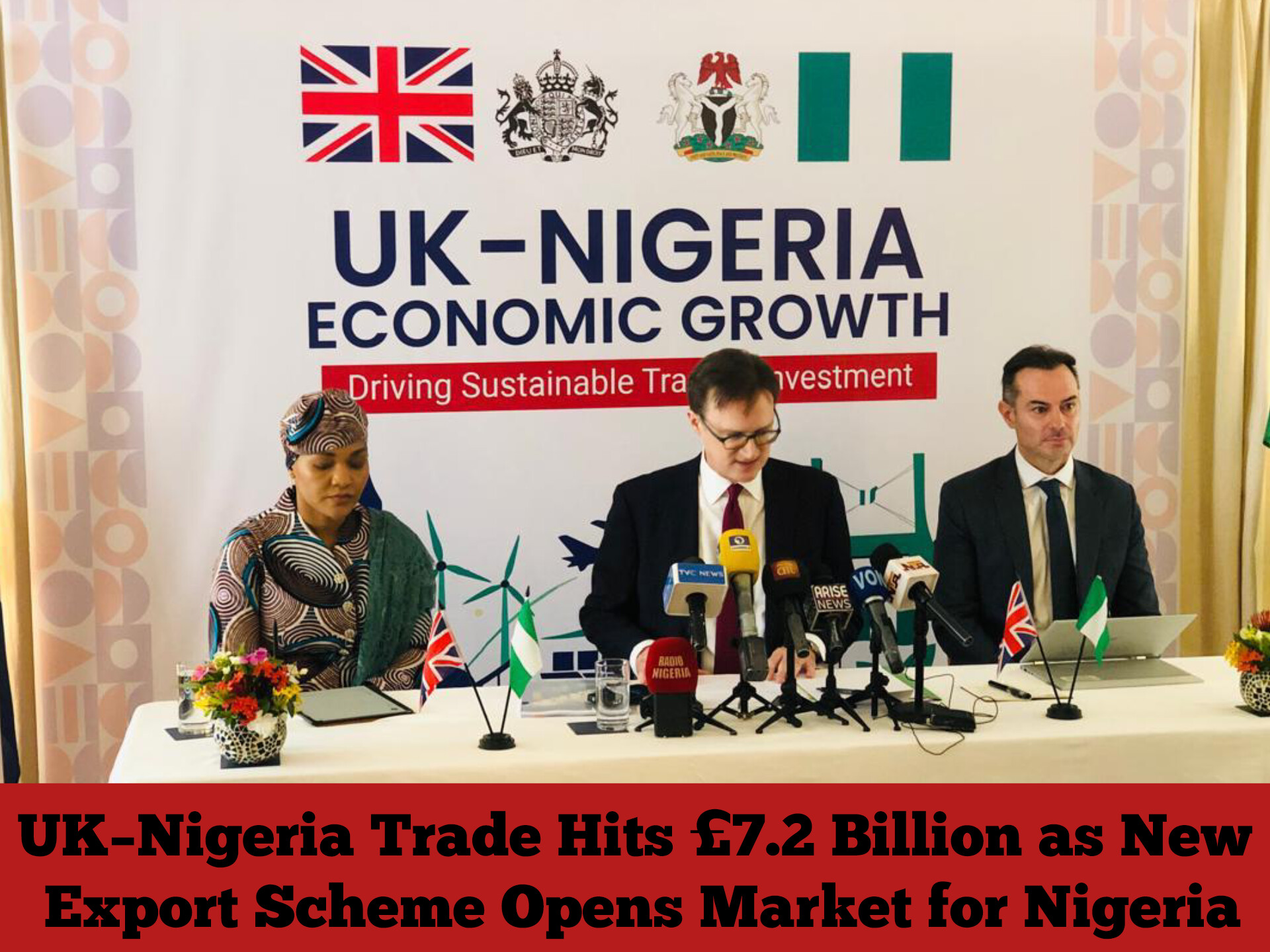The United Kingdom, UK has introduced a tariff free export scheme covering over three thousand Nigerian products stating a broader bilateral ties with the Country.
The UK also stated that it shares a dynamic, long-standing, and multi-dimensional trade relationship with Nigeria currently valued at £7.2 billion.
The British High Commissioner to Nigeria, Mr. Richard Montgomery gave the indications while briefing newsmen in Abuja.
The British High Commissioner to Nigeria also commended a recent World Bank report indicating that Nigeria is on a path to recovery, calling it a positive sign for British investors.

“The UK and Nigeria share a dynamic, long-standing, and multi-dimensional trade relationship, currently valued at £7.2 billion. This partnership is a cornerstone of our broader bilateral ties, driving prosperity, innovation, and collaboration. Nigeria is the UK’s second-largest trading partner in Africa, and the UK’s largest export market, underscoring its strategic importance”.
The British High Commissioner to Nigeria, Mr. Richard Montgomery explained that the partnership with Nigeria remained a cornerstone of broader bilateral ties.
“In February 2024, we signed the Enhanced Trade and Investment Partnership (ETIP) – the first of its kind with an African country, and only globally. This landmark agreement reflects our shared ambition to deepen economic ties. The ETIP is a jointly developed framework designed to foster inclusive growth. It aligns with Prime Minister Starmer’s growth agenda and with His Excellency President Tinubu’s 8-Point Economic Agenda, supporting job creation, economic expansion, and business environment reforms. It enhances collaboration between public and private sectors, promotes technical cooperation, and addresses non-tariff barriers such as quality standards, quotas, import licenses and custom complex procedures to unlock, sustainable trade and investment opportunities”.
He stated that the UK’s tariff-free export scheme covered over 3,000 Nigerian products, including cocoa, cashew nuts, prawns, and flowers.
“We are keen to see greater diversification of Nigerian exports. Through the Developing Countries Trading Scheme (DCTS) and our Trade for Development programme – one of the most generous in the world -, we are supporting Nigeria’s export growth. Nigeria has significant potential to benefit from DCTS, and we encourage more Nigerian exporters to take advantage of the opportunity to continue to trade tariff free with the UK on over 3000 products such as cocoa, plantain, olive oil, tomatoes & other vegetables, yam, shrimp & prawns, and cashew nuts.
We have a Nigerian DCTS champion currently using the DCTS to scale her business. We want to see many more.
This is just a snapshot of our vibrant and evolving trade relationship. Both the UK and Nigeria are open for business, and we are confident that our partnership will continue to grow and thrive in the years ahead”.
“Cocoa – Tariffs removed for cocoa butter (2.5%) and paste (4.5%). Cocoa remains duty free. Nigerian global exports of around £40m (butter) and £10m (paste) a year. UK imports of around £250m of cocoa butter annually of which Nigeria currently accounts for less than 2%. UK imports of cocoa paste around £40m annually with none from Nigeria. Identified by Nigerian Export Promotion Council as key opportunity.
Cotton – Tariffs removed for woven cotton (6.4%) and tariffs on cotton clothes and apparel have been removed. Raw cotton remains duty free. Identified by Nigerian Export Promotion Council as key opportunity.
Fertilisers – Tariffs removed for urea (6%). Nigerian global exports of over £650m in 2021 – tenth largest global exporter. UK global imports of over £200m with none from Nigeria. Fertilisers identified by Nigerian Export Promotion Council as key opportunity.
Flowers – Tariffs removed for fresh cut (4.5%) and prepared (6.5%) flowers. Nigerian global exports of over £10m in 2021. UK global imports of over £600m a year.
Frozen shrimp/prawns – Tariffs lowered for frozen shrimp from 4.2% to 3.6%. Nigerian global exports of over £30m a year. UK global exports of over £300m per year with no imports from Nigeria.
Plantain – Tariffs removed for plantain (12.5%). UK global imports of around £25m a year with very low amounts from Nigeria. Identified by Nigerian Export Promotion Council as key opportunity.
Sesame – Tariffs removed on sesame oil (2.5%-4.5% depending on usage) and sesame cake. Nigerian global exports of sesame oil are around £10m a year. UK global imports of around £15m a year with none from Nigeria. Sesame identified by Nigerian Export Promotion Council as key opportunity.
Tomatoes – Tariffs removed for fresh tomatoes (8% between November-May) and prepared tomatoes (14%). UK global imports of around £500m (fresh) and £350m (prepared) a year. Currently low Nigerian exports but identified by Nigerian Export Promotion Council as key opportunity”.

Mr. Montgomery however expressed concerns over insecurity, attributing it to regional spillovers from conflicts in Sudan and Niger, explaining that the UK government had been working closely with Nigeria’s Office of the National Security Adviser to address the challenge.
He linked rising issues of visa fraud in Nigeria to recent spikes in visa rejections, urging applicants to submit accurate and complete supporting documents to increase their chances of approval.
The Director General of the Presidential Enabling Business Environment Council (PEBEC), Princess Zahrah Audu, said Naira had become more stable and predictable in spite of the current high inflation.
“Those standards have been set, and every country has its standards, and if you’re an exporter, you should know, and you should adhere to those standards, because if not, then those rules will not be accepted into your country. I believe in Nigeria, we also have our own standards too, so it’s something that I think on our end, we need to educate ourselves, even in terms of the regulators, the people at the ports who are handling this agricultural produce for exports. Again, the time lag in getting these exports out, this is something that PEPEC is actively looking at”.
“We’re trying to make dealing with regulators or government generally a lot more efficient. We want to limit as much as possible, one, the human interaction, so we’re going to try and automate or push for automation on as many of our services as possible, and then also we want to limit the exchange of cash so that we make it a lot more transparent, the things that are being paid into official government accounts, and then of course, more important than everything else, efficiency, the time delay in getting things done generally is the major issue for us. In fact, one of the things that we’ve introduced, which I know a lot of the agencies may not be so excited about, but it’s here, it’s here to stay, is our mystery shopping”.
“Every two, three months, we mystery shop all our agencies and we get our scorecards and we send the scorecards to the President. So the President and the Vice President know what the situation of the state is because we need to know, we cannot just take, we don’t want to be blindsided, so we are constantly on top of agencies. And it’s not really about witch-hunting, it’s about helping them get better, giving them areas and recommendations and very short time periods for effecting those changes”.
“And we believe that over a period of time, many of the things that we are trying to institutionalize will just become the norm, especially as regards to timelines, transparency of payments, and automation of services. Once we’re able to get that under control, I think there will definitely be a significant improvement when it comes to dealing with government agencies that are business-facing”.
Princess Audu stressed that deliberate efforts were on, to re-positioned Nigeria as a key driver of bilateral economic growth with the UK and other Countries.




